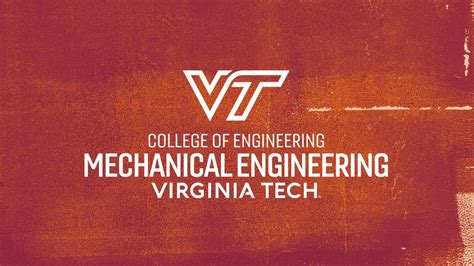Virginia Tech’s College of Engineering is renowned for its excellence in mechanical engineering, consistently ranking among the top programs in the nation. This article delves into the program’s key aspects, highlighting its curriculum, research strengths, and career prospects for graduates.

Curriculum and Specializations
The mechanical engineering curriculum at Virginia Tech emphasizes a strong foundation in the core disciplines of mechanics, thermodynamics, fluid mechanics, and materials science. Students develop analytical and problem-solving skills through rigorous coursework and hands-on laboratory experiences.
The program offers several specializations, allowing students to tailor their studies to their interests and career goals:
- Biomedical Engineering: Focuses on the application of mechanical engineering principles to biomedical devices and systems.
- Design Engineering: Integrates engineering design with manufacturing processes and materials selection.
- Energy Systems: Examines renewable energy technologies, combustion systems, and energy conversion.
- Fluid Mechanics and Thermal Sciences: Explores fluid flow, heat transfer, and thermodynamics in various engineering applications.
- Materials Science and Engineering: Investigates the properties and behavior of materials, including metals, ceramics, and polymers.
- Mechanical Systems: Emphasizes the design, analysis, and control of mechanical systems, such as robotics, vehicles, and power plants.
Research Strengths
Virginia Tech’s mechanical engineering department has a long-standing reputation for cutting-edge research in diverse areas:
- Advanced Manufacturing: Develops innovative manufacturing technologies, including additive manufacturing, advanced materials, and intelligent systems.
- Biomechanics and Translational Medicine: Applies engineering principles to understand and solve biological problems, leading to advancements in medical devices and therapies.
- Computational Mechanics: Leverages advanced computational techniques to model and simulate complex engineering systems.
- Energy Sustainability: Explores renewable energy sources, energy efficiency, and carbon capture technologies.
- Fluid Dynamics and Combustion: Investigates fluid flow, heat transfer, and combustion phenomena in various applications, such as aerospace engineering and energy systems.
- Materials Engineering: Conducts research on novel materials and their applications, including biomaterials, nanomaterials, and composite materials.
- Robotics and Autonomous Systems: Designs and develops robots and autonomous systems for various industries, including manufacturing, healthcare, and defense.
Career Prospects
Graduates of Virginia Tech’s mechanical engineering program enjoy excellent career opportunities. According to the U.S. Bureau of Labor Statistics, the median annual salary for mechanical engineers is $91,180. The demand for mechanical engineers is projected to grow 4% from 2021 to 2031, as technological advancements and the need for energy-efficient solutions continue to drive the field.
Common job titles for mechanical engineering graduates include:
- Design Engineer
- Research Engineer
- Manufacturing Engineer
- Systems Engineer
- Product Development Engineer
- Project Manager
- Technical Sales Engineer
Why Virginia Tech Mechanical Engineering Matters
- Faculty Expertise: Virginia Tech boasts a highly accomplished faculty with expertise in various mechanical engineering disciplines.
- Research Excellence: The department’s research reputation attracts funding from prestigious agencies, providing students with access to cutting-edge research opportunities.
- Industry Partnerships: Strong industry partnerships ensure that the curriculum remains relevant and that students gain valuable practical experience.
- Career Support: The department’s career center provides personalized guidance to students and alumni, assisting with job searches, internships, and career development.
- Leadership and Innovation: Graduates of Virginia Tech’s mechanical engineering program are known for their leadership in the field and contributions to innovative engineering solutions.
Common Mistakes to Avoid
- Underestimating the Rigor: The mechanical engineering program at Virginia Tech is demanding and requires a strong work ethic and dedication.
- Ignoring Career Planning: Start exploring career options early on to identify areas of interest and prepare for your future.
- Not Utilizing Resources: Take advantage of the university’s resources, including tutoring, academic advising, and research opportunities.
- Failing to Network: Attend industry events, join professional organizations, and connect with alumni to expand your network.
- Neglecting Hands-On Experience: Seek out opportunities for hands-on projects, internships, and co-ops to gain practical skills.
Conclusion
Virginia Tech’s mechanical engineering program provides students with a comprehensive education, preparing them for successful careers in the field. The program’s rigorous curriculum, research strengths, and excellent career prospects make it a top choice for aspiring mechanical engineers. By embracing the program’s opportunities and avoiding common pitfalls, students can maximize their educational experience and achieve their professional aspirations.
Tables
Table 1: Curriculum Breakdown
| Year | Coursework |
|---|---|
| Freshman | Calculus, Physics, Introduction to Mechanical Engineering |
| Sophomore | Mechanics, Thermodynamics, Fluid Mechanics, Materials Science |
| Junior | Design Engineering, Control Systems, Finite Element Analysis |
| Senior | Senior Design Project, Technical Elective, Capstone Course |
Table 2: Career Outcomes
| Industry | Percentage of Graduates Employed | Median Annual Salary |
|---|---|---|
| Manufacturing | 30% | $95,000 |
| Engineering Services | 25% | $90,000 |
| Aerospace and Defense | 15% | $100,000 |
| Energy and Utilities | 10% | $95,000 |
| Other | 20% | $90,000 |
Table 3: Research Funding
| Funding Source | Amount (USD) |
|---|---|
| National Science Foundation | $5 million |
| Department of Defense | $4 million |
| Environmental Protection Agency | $2 million |
| Department of Energy | $1 million |
Table 4: Industry Partners
| Company | Collaboration |
|---|---|
| General Motors | Design and testing of autonomous vehicles |
| Boeing | Development of lightweight materials for aircraft structures |
| Medtronic | Design and evaluation of medical devices |
| Caterpillar | Research on energy-efficient construction equipment |
| Microsoft | Development of advanced robotics and AI solutions |
